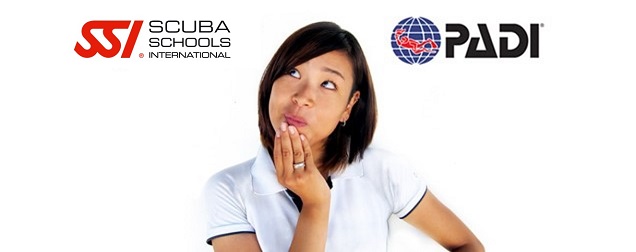
Both PADI and SSI are internationally recognised and you can dive anywhere in the world with either certification. There are actually a multitude of dive agencies that offer certification courses, most of which as non-divers you’re likely never to have heard of: BSAC, CMAS, NAUI, ANDI, TDI, SDI and more besides are all recognised and any dive centre regardless of affiliation will accept your certification.
You can switch and change too — you don’t have to stay with the agency that you pick for your first course. The science, skills and techniques don’t change with whatever agency you choose but the methodology can be a little different. As an example, a PADI course runs in a set order, meaning the student must complete skill A before moving to skill B, whereas an SSI course flow can be altered to suit the student. If you were having trouble mastering a skill with SSI, then your instructor is allowed to move on, get you comfortable and build your confidence with something else, and then return to that challenging technique.
While price should not be an overwhelming factor in choosing where to dive, consider that most centres do offer SSI a little more cheaply than PADI. They can do this as SSI allows students to borrow books or do all the theory online whereas with a PADI course it’s compulsory to buy a book — this is certainly a factor to consider when cramming everything into your backpack. SSI books are available for sale should you want one though. As a diver, care for your environment should be very close to heart so consider whether you really do need a paper version no matter which you choose.
Both PADI and SSI now offer online learning so you can actually complete the theoretical part in front of your computer at home before you come. This will save you some time on your holiday. There is a review with your instructor in either case, so any concepts that need further explanation can be covered. The difference here is both cash and longevity: SSI’s online learning is free, whereas with PADI you will pay US$130.
There is also one important thing that you must take into consideration when starting a course : dive insurance. SSI offers free decompression treatment insurance for all entry-level course students.
The final thing that should be explained to you is about your certification card. SSI offers free digital certification card whereas with PADI you have to pay extra. With PADI, Centres have to either send off certification details or process them online to submit them to PADI in Australia. You can still dive straight away though and you do get a temporary card that is valid for 90 days. Your real card will be sent to the address you choose. Once again, as a diver, care for your environment should be very close to heart so consider whether you really do need a plastic card no matter which you choose.
Source: Travelfish.org
Similarities
Differences
- Internationally Recognised – Dive anywhere in the world
- Interchangeable – you can get certified as an Open Water Diver with SSI, then Advanced Diver with PADI
- Safety – Science, Skills and Techniques the same
- Water Flexibility
SSI: Yes. Taught with an 80/20 approach. The instructor can adapt 20% of the course to fit the pace of learning, ensuring a student focused training programme.
PADI: None. Skills performed in rigid sequence with no manoeuvre room for changing water conditions, student learning pace. If you do change, you break standards.
- In House Theory
SSI: Loaned Books supplied in our dive center, yours to borrow for the course
PADI: You must purchase a manual – adding cost and baggage weight
- Certification ID
SSI: Printed within the day. Free digital card.
PADI: Sent to your home, 90 day temporary card issued. Extra cost for digital card.
- e-Learning
SSI: Yes and it’s free!
PADI: Yes but priced at $130
- Insurance
SSI: Yes and it’s free for entry level courses!
PADI: No
Well, honestly when it boils down to it, it’s your decision. There’s no difference in training quality, world wide recognition or experience level. All of The Life Aquatic Samui instructors are dual rated meaning we can teach both PADI and SSI courses, we just have our preference to SSI based mainly on the flexibility allowed in the changing waters of the Gulf of Thailand. But whether you choose PADI or SSI, you will be taught well — so don’t agonise, just dive in there and blow some bubbles!


